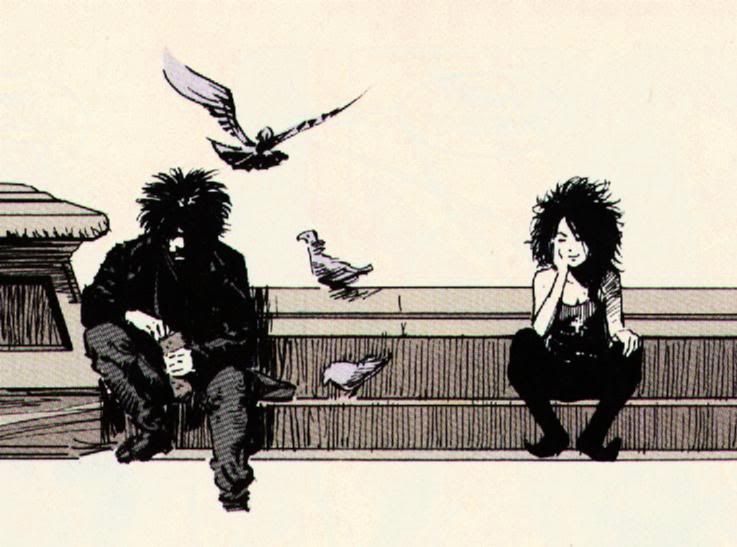
"I still do not see what purpose this will serve...[but] It might be interesting." Morpheus is obsessed with purposes and reasons and rules and regulations and power and all sorts of Type A obsessions, at least as presented so far, so this bit of dialogue lets us know that the story will be a wee bit different. I myself don't understand the point of Death's exercise, except to get Dream to go out and meet his minions.
And as for Death, what do we learn of her? When Hob basically insults her very being, her very reason, and her occupation, her reaction is not anger or vengefulness. She is amused! And as a result of her amusement, she chooses to make his belief come true; he will live on.
I am pettily amused by the first panel, and how pub grumblings back then are basically on the same lines as pub grumblings today. Things do not change with time; how well this sets up the story of the man who will not change with time (not physically at any rate!).
And so we ride through time in this oddly standalone interlude in the book (though pieces are placed for future stories, i.e. Dream's deal with Shakespeare), where Dream meets with Hob once every 100 years.
I could never put my finger on exactly why I liked this story so much the first time, and still do now: it reminds me of the original Time Machine movie, with Rod Taylor (the hotness!). To me, it's an extended version of one of my favorite movie scenes of all time, where George sits in his time machine, absolutely still, watching the shop window dressings change as time goes by, variously amusing George, titillating him, exciting him. The mannequin sequence leads into a longer, more disturbing sequence, where his home is transformed, the city is transformed, and even nature herself is transformed.
But still, "The years roll by, everything unfamiliar. Except the smile of my never-aging friend." So is Dream Hob's mannequin? Or is Hob Dream's constant? As they both barrel through their respective immortalities, who is more in need of a reminder that la plus ca change, la plus le meme chose?
Other notes:
-Fun Chaucer cameo!


Men of good fortune
ReplyDeleteOften wish that they could die
While men of poor beginnings
Want what they have and to get it they’ll die
Truer words, and all that.
While Morpheus is a stickler for rules, the Type A/B dichotomy seems a bit reductive. He's hardly a creature who has trouble with stress, or relentless ambition. But that's not to say he's well-balanced.
Morpheus's problem - well, one of his problems - is that he cares for the Dreaming but not for the dreamers. That's why Death brings him to the White Horse. While he only sees mortals on his own terms, she gets to meet us in all our glorious folly - from the soldiers who die saving their friends to the kind of people who get nominated for the Darwin Awards. She sees what it's like to live with the knowledge that you're going to die - that one experience she'll never share, even with the Endless. No wonder Hob's attitude is refreshing.
It is significant that it's Morpheus's idea to grant the wish. Death loves us, but she doesn't toy with us. Think about Hob’s question in 1689. I suspect Morpheus knows exactly how hungry a man can get if he doesn’t eat but doesn’t die. And he must have known that when he had the idea of making him immortal.
On a side note, I see what Gaiman means about the the colour problems in early Sandman. The separations were terrible on this issue. Hob’s shirt goes from brown to blue, there’s bright pink all over the place, it’s a right shambles. Such a shame, because the period detail is great.
You can see how someone like Morpheus gets his attitude to change. Taking the long view, all that seems to alter is the outfits. He’s wrong though. There are parts of his friend that are forever Gadling, but it's clear that Hob changes with the centuries. Not just his job or his business, but his view of humanity. He begins as a man who would knife you for a loaf of white bread. Even in 1789 he's talking about the slave trade as a nice littler earner. But he learns to value human life, even though he's watched it snuffed out all around him. Maybe even because of that.
In a way though, I imagine it's good to have a comrade who experiences time the way he does who's not involved in the petty politics of The Family. Even Death plays her own little games, trying to make sure that the rest of the family fear her if nothing else. (I may be wrong, but I don't think we ever see Desire cross Death, which is why it's interesting that Hob doesn't want to live longer because he desires immortality or longer life, but because he doesn't want to be enslaved to someone else's idea of when to punctuate his being.
ReplyDeleteThis is the one issue where the colors actually come off better on my computer version of the comic. When I was at home, happily sat amongst my trade paperbacks, this was the only one that actually looked MURKIER than the scanned version.
The changes in Hob Gadling are one of my favorite threads running through the series, and the best is yet to come :) He's always such a welcome surprise when he shows up.